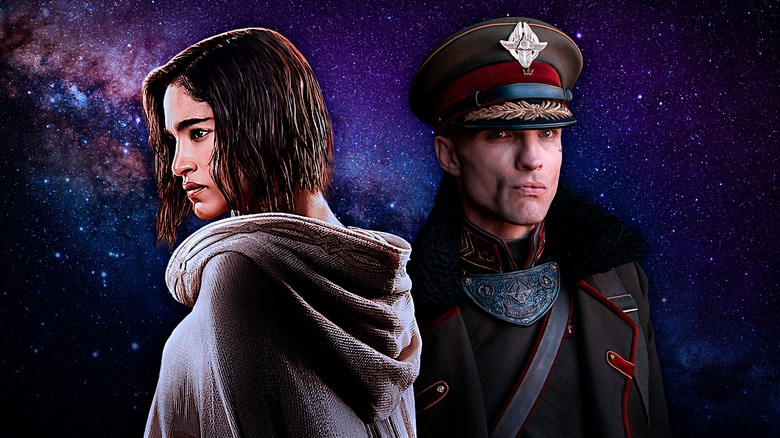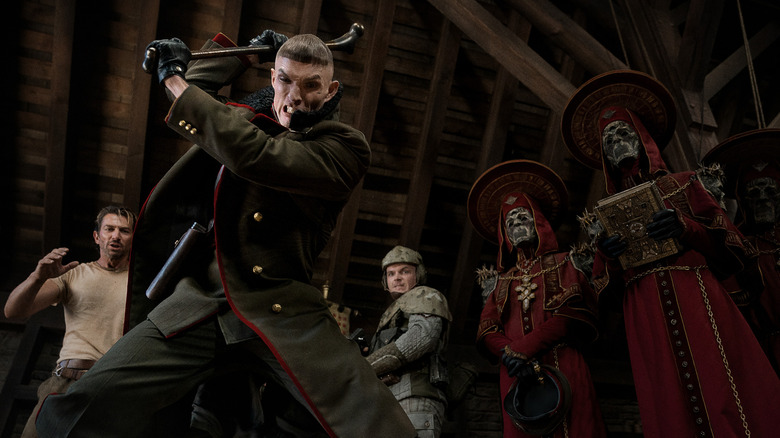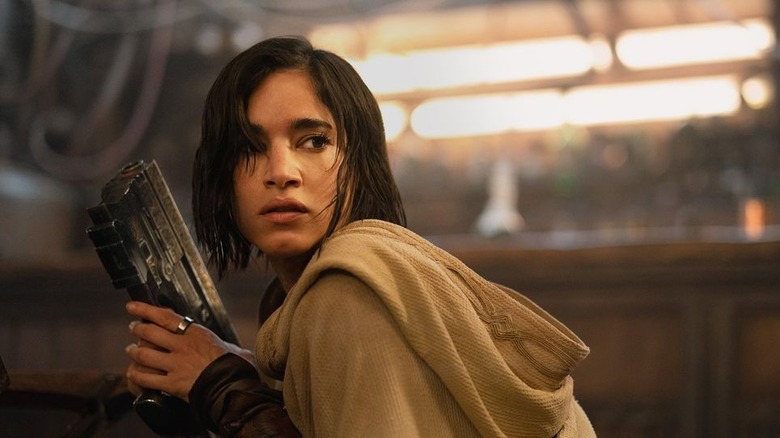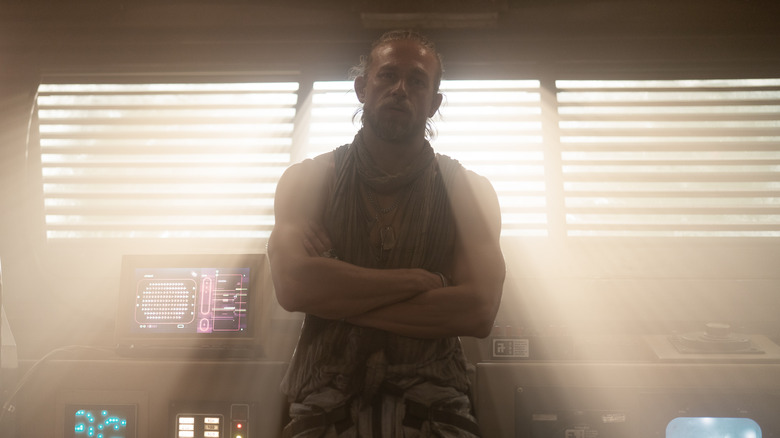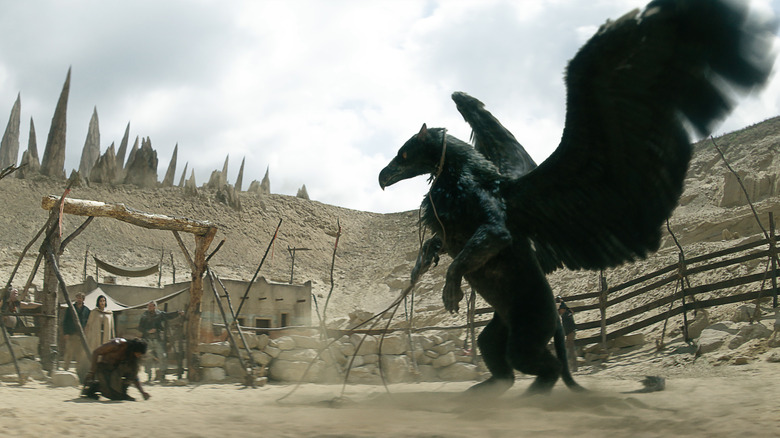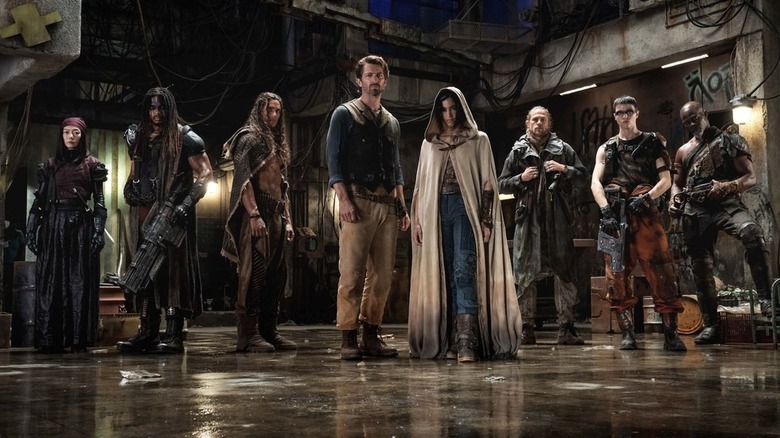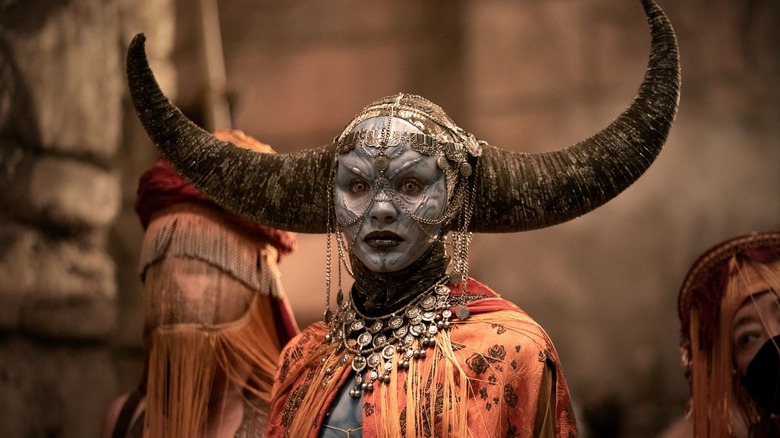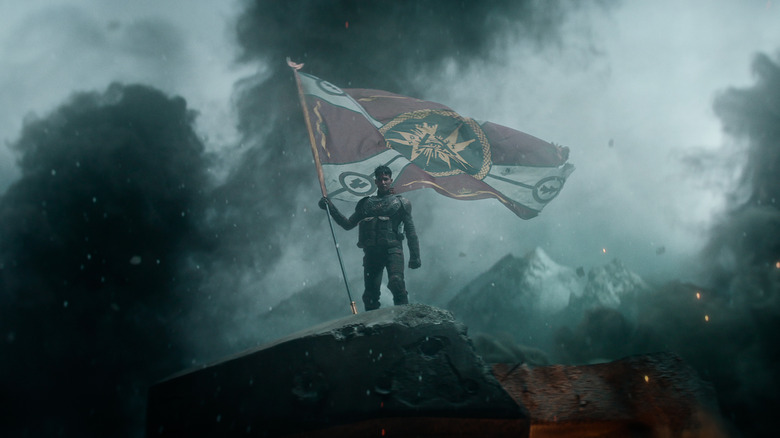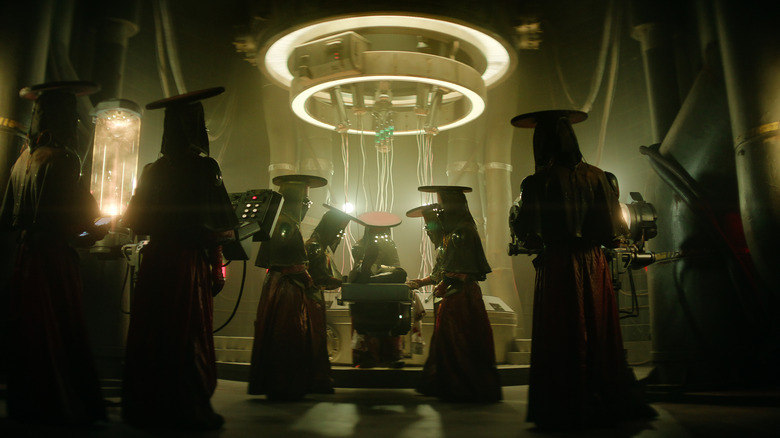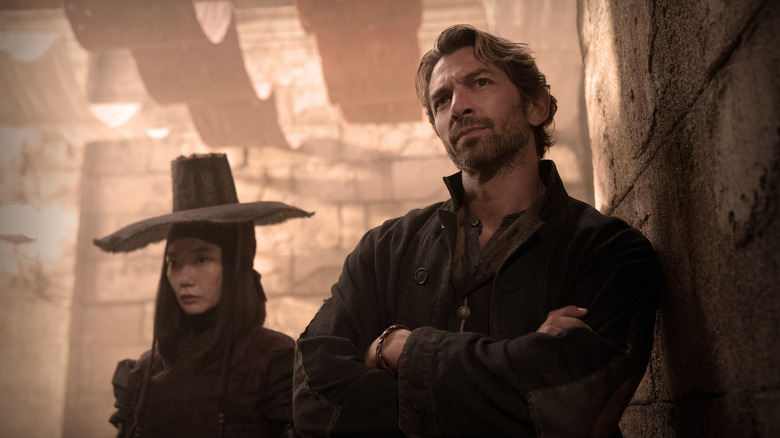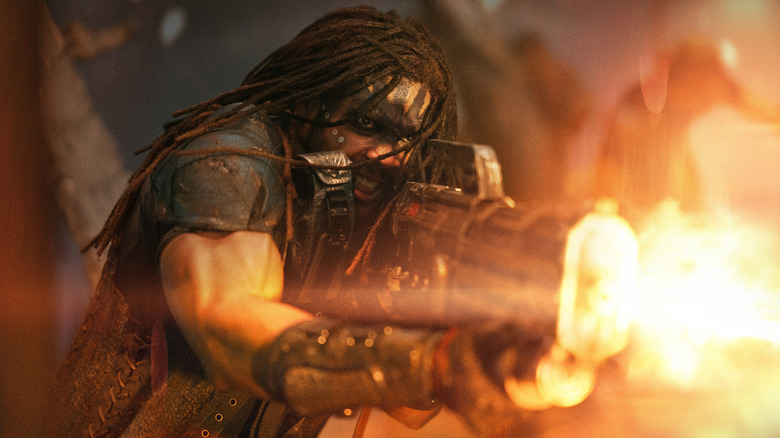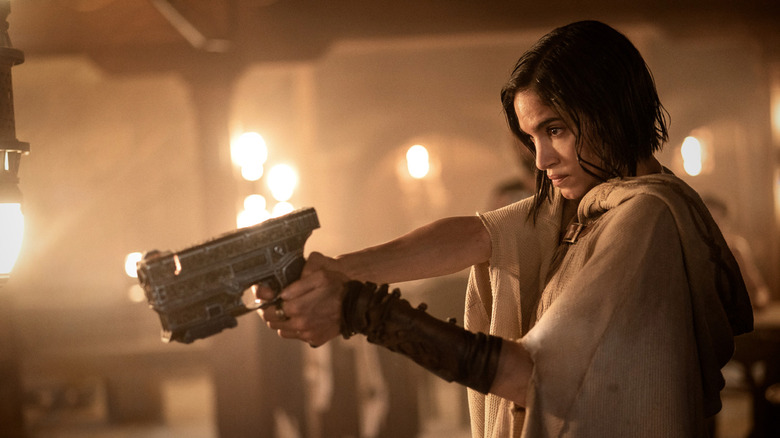Biggest Plot Holes In Rebel Moon
Contains spoilers for "Rebel Moon — Part One: A Child of Fire"
The next big Zack Snyder movie has arrived in the form of Netflix's "Rebel Moon — Part One: A Child of Fire," and it's, well, polarizing. If you're at all familiar with Snyder's general cultural imprint, that probably isn't at all surprising. The new space opera — which started as a "Star Wars" script pitched to Disney in the early days of its Lucasfilm ownership — is about what you'd expect. It's a visually stylish action saga with heavy-handed dialogue and too much slow-mo.
Critics have blasted the film for being little more than a collection of genre clichés and cool shots, with little time allocated to actual character development. But not everyone has been so quick to condemn the film. Many viewers have praised the high genre style and camp of "Rebel Moon," which is, if nothing else, intentional. The title card for the film looks like a pulp paperback book cover, evoking the Warhammer 40,000 stories that "Rebel Moon" pulls from so directly. If you've never been a fan of Snyder's aesthetic in the past, this isn't likely to be the movie that converts you. But if you're willing to suspend your more critical eye, it can be a fun ride with a lot of rich world-building.
Unfortunately, there are still several story beats that just don't make a lot of sense. Snyder has always been more focused on style than substance, after all, leaving some pretty big plot holes in "Rebel Moon."
Why would Sindri tell such an obvious lie?
"Rebel Moon — Part One: A Child of Fire" starts with a stirring narration from Anthony Hopkins, which explains the state of the Motherword's galactic conquest while showing pieces of its impressive fleet. We then descend to the farming colony on Veldt where Kora (Sofia Boutella) is plowing fields beneath a stunning alien sky. In the ensuing scenes, we learn what life is like in this curious Nordic village in the stars and meet several key characters, including the village leader, Sindri (Corey Stoll).
From the start, Sindri is wise and kind. It's also heavily hinted that he supports the growing revolution against the Motherworld. So it's particularly curious when Motherworld forces arrive and Sindri talks himself into an impossible corner in record time. Admiral Atticus Noble (Ed Skrein) lands in the village and immediately offers Sindri a deal — the excess of their harvest for three times the market value. Not wanting to get in bed with the evil space Nazis, he lies and says that they have nothing to spare. It's well-intentioned, but it's also such an obvious lie that Sindri gets killed about two minutes later.
Yes, Noble likely would have killed him regardless, but this whole move just feels ill-conceived and out of character. More than anything, Sindir wants to protect his people. Wouldn't that be easier to do if he took the offer at face value and figured out the rest later? If he knows how bad the Motherworld is, he knows they won't take no for an answer. But giving them no for an answer is apparently the only plan he can think of.
Kora's cantina scene makes no sense
After she murders every single soldier left by Noble on Veldt, Kora embarks on a grand journey to assemble warriors who can defend the village when the Motherworld returns. If you've seen "Seven Samurai," or, you know, "A Bug's Life," you know exactly what to expect. Gunnar (Michiel Huisman) goes with her because he's sold grain to the resistance in the past and has a contact in the port town of Providence (we promise it's not Mos Eisley from "Star Wars"). They arrive just in time to see Gunnar's contact being arrested by bounty hunters and then walk straight into the bar he was just pulled out of (it's definitely not the cantina from "Star Wars").
After all of that sneaking around, Kora proceeds to announce their entire plan to the whole bar. It hasn't even been five minutes since someone was arrested right where she's standing for revolutionary activity, but that doesn't stop her from asking the whole place where she can find General Titus (Djimon Hounsou). Not only that, but she gets an answer immediately. A weird brain squid alien tells her exactly where to find him, right down to the street address and apartment number — from across the galaxy, mind you.
This whole sequence is just baffling. Kora acts so careful up until this point and then drops all sense of caution. The people in this bar don't exactly seem trustworthy — and spoiler alert, they're not. But Kora doesn't have time to think about that, because we have a plot to get to.
Why would Kora trust Kai in the first place?
After shooting up the cantina and announcing her entire plan to the assembled scum and villainy, Kora meets Kai (Charlie Hunnam). A mercenary and smuggler, Kai immediately offers his ship to help their cause. And Kora, after about five seconds of consideration, accepts.
If you've seen the movie, you know that Kai betrays Kora in the final act. But really, you only need to watch this scene to know that that's going to happen. Kora explains that she just saw him turn over their contact to bounty hunters five minutes earlier. She sees visual proof that he's in bed with the bad guys and has no moral allegiances. But all Kai has to say is "Uh, but see, I'm actually cool," and she's totally on board.
There is no reason for Kora to trust this man. He shoots one guy in the bar to "save" her, but that's not enough to prove he's reliable. His entire explanation for why she should trust him despite him working with the bounty hunters is that he only cares about getting paid, not the Motherworld. But then she tells him that she can't pay him, and he's all like, "Okay, that's fine." It definitely feels like a double-cross Kora realistically should have seen a mile away.
The bet to free Tarak would never fly
Right after hiring himself onto Kora and Gunnar's crew, Kai convinces them to make a pit stop on a random planet to find a guy who may or may not be able to help them. Just on its face, this is confusing. The mission is already scattered because Kora wants to find Titus, but they're also trying to find the Bloodaxes. It's obvious that Kora and Gunnar don't have a plan, because they instantly accept Kai's idea.
When they find Tarak (Staz Nair), he's working off a debt as an indentured servant. And then a truly baffling series of events takes place. The man he's working for demands a huge amount of money for Tarak, which Kora explains is impossible. He then offers to gamble the man's freedom on a bet that Tarak can't tame the wild griffin creature he has penned up outside. If Tarak succeeds, he agrees to let him go. But if he fails, Kai, Kora, and Gunnar will all become indentured servants too.
It's hard to choose which part of this is more absurd: That the guy makes this offer in the first place, or that Kora agrees to it. She has just met Tarak — a man recommended to her solely by Kai, who she also just met. She shouldn't be gambling her own freedom for one random guy on a farm. On the flip side, it makes no sense for Tarak's boss to bet him away like this. He could simply order Tarak to tame the creature and then still not free him. But hey, anything for some more cool slow-mo, right guys?
It shouldn't be so easy to assemble the crew
After getting Tarak, Kai takes Kora and Gunnar to recruit the swordswoman Nemesis (Bae Doona), General Titus, and eventually, the Bloodaxes. Like with Tarak, we get some fun, stylish little vignettes to introduce each member of the squad, though they don't really get to interact with each other at any point. (Maybe they're waiting for the director's cut?) But either way, the bigger problem here is just how easy this whole scheme is. The longer the recruitment drive goes on, the more suspicious it starts to feel.
Quite simply, it should not be this easy to build an elite fighting force to stand against the Motherworld. We learn later that Kai is only doing this to assemble a more substantial bounty. But he's the one who knows where everybody is. Kora doesn't even want to go and get Tarak or Nemesis. She only cares about Titus and the Bloodaxes. So if Kai is the one who knows where those other people are, why doesn't he just tell the Motherworld and collect a reward in secret? Why go to all this trouble to recruit them?
You could say that he needs Kora to trust him, but she already does with zero prompting. You could say that the rebels need to be caught in the action of revolution, but that's not true either, as we've seen that the Motherworld is fine with killing innocent people. Noble even knows where the Bloodaxes are because of the rebel Kai turned in at the beginning of the movie. So if it's so easy to find all these people, then what's the point of the long con?
How come there are so many more humans than aliens?
This one might feel a bit more nitpicky, and to be fair, it isn't exactly a plot hole. But it is a bit curious that humans are so clearly the dominant race in the galaxy. We see a lot of fun alien designs in the movie, but we learn basically nothing about how they relate to humanity. The Motherworld is presumably the origin point of humans in this universe, and since they're conquering the galaxy, you'd think that more aliens would want to take up arms. But the entire main crew, as well as the Bloodaxe faction, are all humans.
The real answer here is probably a logistical one. Simply put, it's way harder to have major alien characters because they require either extensive makeup, CGI, or both. There's nothing wrong with a movie taking the easy way out with this, and it's something that Star Wars is often also guilty of. But in a story about a galactic, fascist human empire, the total lack of alien worldbuilding feels a bit strange.
Countless worlds
During one of Kora's dramatic backstory monologues, she says that she "fought on countless worlds" during her time in the Motherworld's army. And yes, this is a nitpick ... but no, she didn't. We're told that Kora was given a command at the age of 18, and she's been hiding on Veldt for only a couple of seasons at the start of the story. Sofia Boutella is 41 years old, so it's reasonable to assume that Kora was in the military for a decently long time. But countless worlds? Really?
The bigger problem here is that we're given zero context for the scale of the Motherworld's warring. We know that the empire is large, but also small enough that there are plenty of territories beyond its reach. We know that there are alien kings and entire civilizations that have nothing to do with the Motherworld. We're told in the opening narration that the galactic wars started because the Motherworld itself was drained of natural resources, prompting its government to steal those of others.
Even with all that, though, we don't get a sense of the scale. Planets are huge. Galaxies are huger. It's hard to imagine a planet with depleted natural resources leading such expansive military campaigns across "countless worlds" and never being challenged.
The Motherworld's methods don't really make sense
On the subject of the Motherworld's troubled past, let's talk a bit more about the methods of the villains in "Rebel Moon." From the start, the assassination of the royal family is portrayed as the moment that sparked the planet's decline. This is symbolized by Jimmy (Anthony Hopkins), a robot soldier serving the Motherworld who arrives on Veldt early on. Through Jimmy, we learn that the Motherworld once had an entire army of robot soldiers, but that they refused to keep fighting after the royal family was killed. Since Jimmy is shown to be a good guy, we can assume that things got way worse after the assassinations.
The problem there is that the Motherworld was already destroying whole civilizations long before that. Kora is abducted by a war criminal and later becomes a bodyguard to the princess. In one very strange flashback, the old king (Cary Elwes) tells Kora that his daughter will return the Motherworld to a brighter age because she has magic. But ... couldn't he just, you know, stop the war himself?
The only reason he wouldn't is the one we're told at the start: The Motherworld needs resources from the planets it conquers. But we never actually see that. All we see is wanton destruction — military campaigns that seem to expend far more resources than they gain. It's a confusing setup, driving home the idea that we're not supposed to think too hard about the villains. They're just evil for the sake of it at the end of the day.
Why doesn't Kai lock up Gunnar at the end?
The climax of "Rebel Moon — Part One: A Child of Fire" occurs after Kai pulls his entirely unsurprising twist. He lures the crew he himself has assembled into a trap and captures them all to present to Noble. The creepy robot spider things that we see throughout the movie instantly incapacitate every member of the team, with one exception. For some reason, Gunnar is left alone.
Maybe the bounty hunters just brought one too few spider things. Okay, sure, let's go with that. But even if that's true, it makes zero sense for Kai to then give Gunnar the device that activates them. What exactly is the plan here? Is he trying to break the farmer's will? Prove a point? Whatever Kai's reasoning, Noble makes no argument. He gleefully watches as Gunnar is literally handed the key to the cages and then is somehow shocked when he quickly sets all the rebels free.
There's nothing else to say about this scene. Gunnar is no one to these bad guys, and there's no reason for them to make him activate Kora's device himself. Not 30 seconds earlier Noble mentioned how much Gunnar had surprised him — a rarity. So why give the one unpredictable guy a weapon with no handcuffs? It makes no sense, and it's the only reason the final battle happens at all.
Darrian Bloodaxe didn't need to die
In a film filled with underdeveloped characters, Darrian Bloodaxe (Ray Fisher) immediately makes an impact. His sister Devra (Cleopatra Coleman) has a tiny role and will presumably be featured more prominently in "Rebel Moon — Part Two: The Scargiver." Darrian's role is also pretty small, as he's the last to join the team, but Fisher is so charismatic that he makes Darian a clear and compelling character.
It's a shame that we only get to see him in a few scenes. For whatever reason, Snyder decided to kill off one of his most exciting characters (played by one of the best actors in the movie) to give the final battle of "Part One" a bit more emotional punch. It's a weird choice for a couple of reasons, not least of which is the fact that we still barely know Darrian when he dies. He has a lot of potential, sure, but his death doesn't add anything to the overall movie because we haven't gotten to know him yet.
Adding insult to injury, his death feels kind of unnecessary. He sacrifices himself by leaping at the gunner's seat of Noble's ship, stabbing the soldier inside through the glass to stop his assault but dying in the process. But if the cockpit was so fragile that a stick could pierce it, why wouldn't Darrian just shoot it? He has the biggest gun in the universe and the ship is close enough that he can jump to it. Maybe Snyder just wanted that shot for the trailer (to be fair, it does look pretty cool).
Kora loses her gun for no reason
Darrian isn't the only character to come down with an acute case of "I lost my gun" syndrome at the end of "Rebel Moon." As Noble tries to escape, Kora chases after him, but the ship that Darrian destroys comes crashing down on the bridge between them. It's unclear exactly what happens, but Noble falls onto a lower platform. Kopra then leaps down in pursuit, completely unarmed.
In the shot right before when she's chasing him, she has a gun in her hands. Maybe the collision of the ship somehow jostled it loose, but she doesn't seem to be at all injured. Plus, she drops down from above, suggesting that her portion of the bridge wasn't destroyed completely. So what happened to the gun? Where did it go, and why does she jump down to face Noble without retrieving it?
There is no good explanation for this other than Snyder wanting a climactic hand-to-hand fight. Also, it's already pretty absurd that Noble survives their battle, but it would have been even more ridiculous if he had been shot in the head. His cyborg body makes surviving an impact somewhat believable, but if Kora was strapped in that fight? There's no way he would have made it out alive. And of course, we need him for "Part Two."
